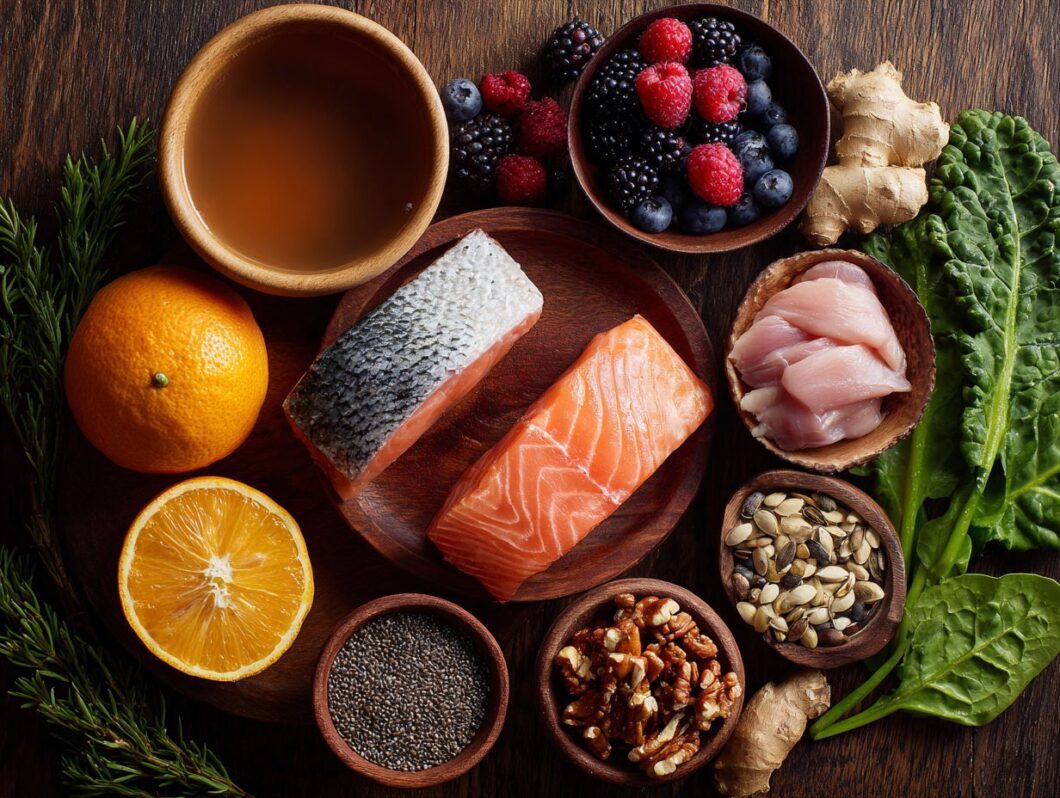Unlocking youthful skin and vibrant health starts with understanding collagen-the essential protein that supports our skin’s structure and elasticity. With a diet rich in collagen-boosting foods like bone broth and vitamin C-packed fruits, you can significantly enhance collagen production. In this article, we’ll explore the top foods that naturally elevate collagen levels, empowering you to nourish your skin and overall well-being effectively. Discover how small dietary changes can lead to remarkable benefits for your health!
Key Takeaways:
What is Collagen?
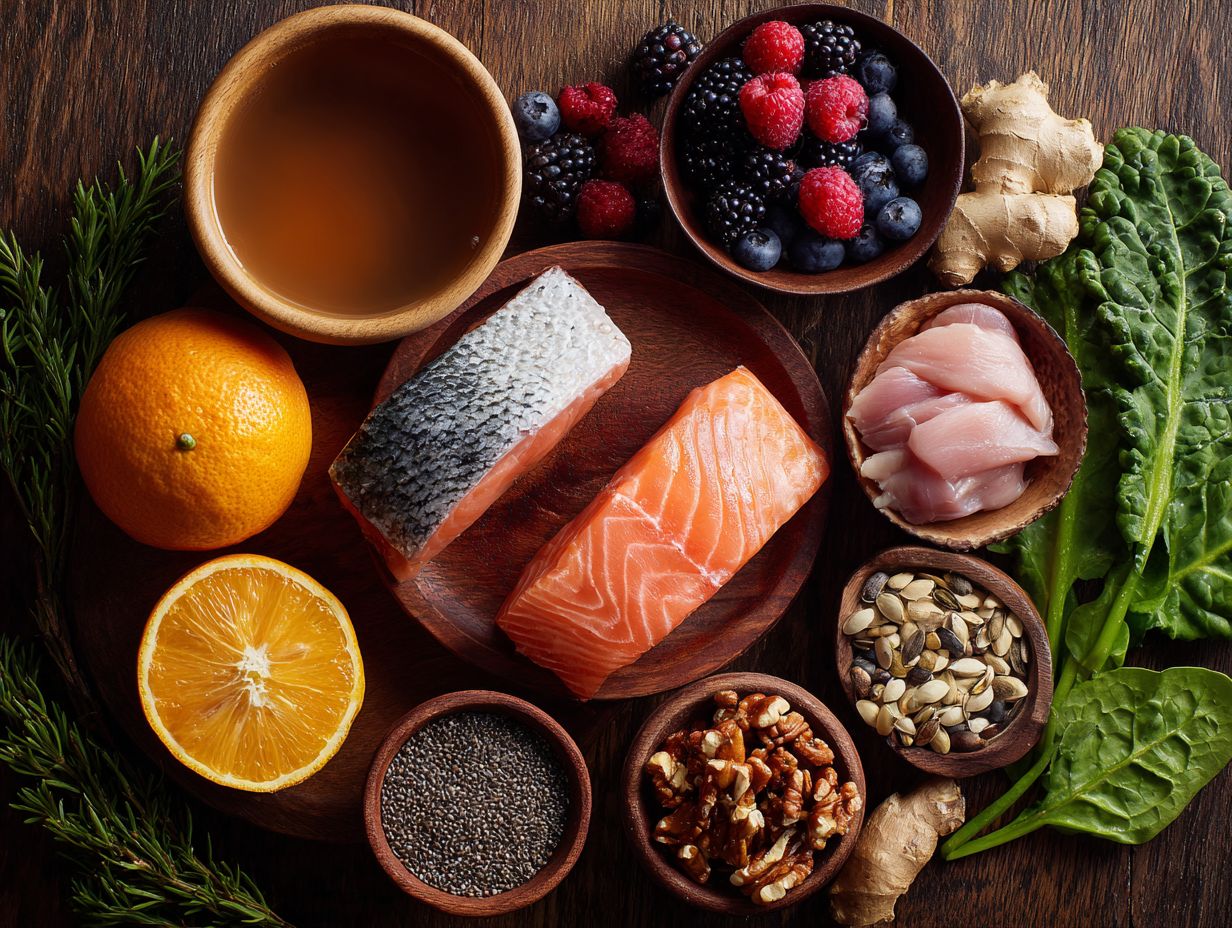
Collagen is a structural protein that serves as the foundation for connective tissues such as skin, tendons, ligaments, and bones, accounting for approximately 30% of the body’s total protein content. There are several types of collagen, with types I, II, and III being the most prominent.
Type I is the most abundant and is primarily found in skin, bones, and tendons, where it provides essential tensile strength. Type II, on the other hand, is mainly located in cartilage and plays a crucial role in maintaining joint health. Type III supports the structure of blood vessels and skin.
To incorporate collagen into my diet, I can opt for:
- Bone broth
- Collagen peptides
- Various supplements
Brands like Vital Proteins and Sports Research offer high-quality sources. Regular intake of collagen can enhance skin elasticity, support joint function, and contribute to overall health improvement.
The Importance of Collagen for Health
Collagen plays a crucial role in maintaining skin elasticity, joint health, and bone strength, making it essential for overall health and aging gracefully. Research supports these benefits, as evidenced by a clinical trial where participants reported a 30% improvement in skin hydration after just 8 weeks of collagen supplementation.
I have also observed that regular collagen intake can significantly enhance joint pain relief, with many testimonials highlighting reduced stiffness following exercise. Additionally, collagen is associated with increased bone density; a study indicated that women who consumed collagen daily demonstrated greater bone strength over the course of a year.
Incorporating collagen-rich foods, such as bone broth, or utilizing supplements like Vital Proteins (which are priced around $25), can serve as effective strategies for reaping these health benefits. Consider collagen peptides or hydrolyzed collagen for optimal results.
Key Nutrients for Collagen Production
I recognize that certain nutrients are essential for collagen synthesis, with vitamin C and specific amino acids playing the most significant roles in this process.
Vitamin C and Its Role
Vitamin C is a powerful antioxidant that not only protects collagen from degradation but also plays a crucial role in its synthesis, helping to stabilize collagen molecules. To effectively support my collagen production, I aim for a daily intake of 90 mg for men and 75 mg for women.
I find excellent dietary sources of vitamin C in citrus fruits like oranges and grapefruits, which are particularly rich in this essential nutrient. Berries, including strawberries and blueberries, are also great options. Additionally, I consider incorporating bell peppers and dark leafy greens like kale into my meals.
By integrating these foods into my diet-perhaps through a berry smoothie or a citrus salad-I can significantly enhance my natural collagen synthesis.
Amino Acids: Building Blocks of Collagen
Amino acids such as proline, glycine, and lysine play critical roles in collagen formation, with each contributing uniquely to the protein structure. Proline is instrumental in maintaining collagen stability and structure, while glycine is essential for creating collagen’s triple helix configuration. Lysine, on the other hand, facilitates collagen cross-linking, thereby reinforcing the overall structure.
To effectively support collagen synthesis, I recommend aiming for a daily protein intake of 46 grams for women and 56 grams for men. Incorporating high-protein foods into one’s diet can help achieve these goals.
Some excellent options include:
- Chicken (31g per 100g)
- Fish (especially salmon at 25g)
- Legumes like lentils (9g)
These foods not only provide the necessary amino acids but also contribute to overall health and well-being.
Top Foods That Boost Collagen
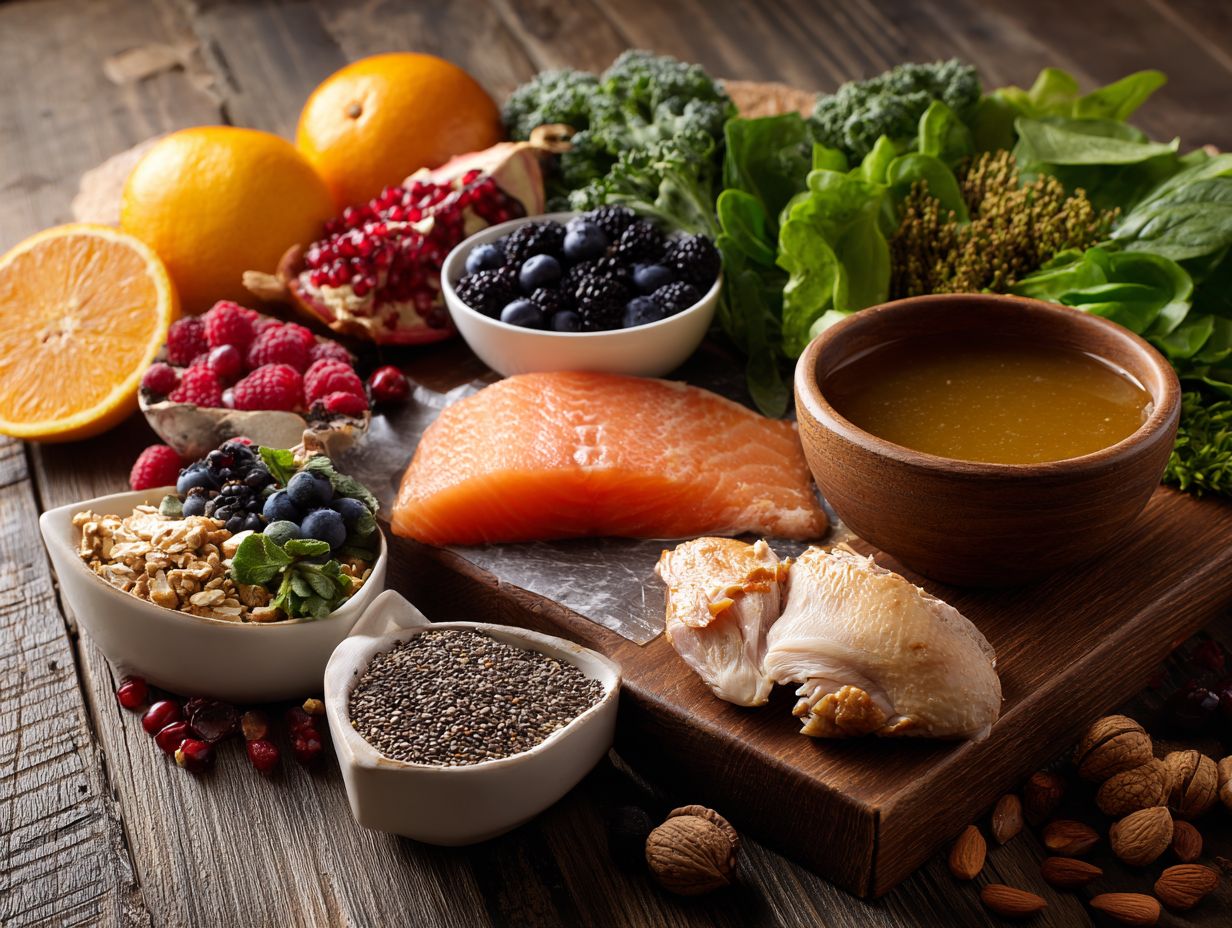
I have found that incorporating specific foods into my diet can significantly enhance my body’s natural collagen production, which in turn leads to improved skin and joint health.
Bone Broth
Bone broth is an exceptional source of collagen, gelatin, and amino acids, all derived from simmering animal bones, making it highly beneficial for collagen support.
To prepare bone broth, I begin by roasting the bones in the oven for about 30 minutes. Then, I simmer them in a large pot with water, onion, carrots, and herbs for a duration of 12 to 24 hours. To further enhance the nutritional content, I often add apple cider vinegar, which aids in mineral extraction.
For those who may not have the time to make it from scratch, I recommend purchasing high-quality bone broth from reputable brands such as:
- Kettle & Fire
- Osso Good
These are readily available in health food stores or online.
I find that regular consumption of bone broth is believed to support joint health, improve gut function, and enhance skin elasticity.
Leafy Greens and Vegetables
Leafy greens such as spinach and kale are abundant in chlorophyll, which has been shown to increase collagen levels in the body while also providing essential vitamins and minerals. To effectively boost collagen production, I aim for three servings of leafy greens each day.
I often incorporate spinach into my smoothies or salads and enjoy steamed kale as a nutritious side dish. To enhance nutrient absorption, I pair these greens with vitamin C sources like citrus fruits or bell peppers. Using cooking methods such as steaming or sauting helps retain their nutritional benefits.
If fresh greens are not readily available, I consider using a leafy green powder supplement to ensure I maintain a consistent intake for optimal collagen support.
Fruits Rich in Vitamin C and Antioxidants
Fruits such as oranges, strawberries, and kiwi are not only delightful to consume but also essential for collagen production due to their high vitamin C content.
Incorporating these fruits into my diet can be quite enjoyable. For instance, I often add orange segments to a fresh spinach salad for a refreshing twist. I also like to blend strawberries into a smoothie with yogurt for an extra protein boost. Kiwi, when sliced, serves as a colorful topping for oatmeal or yogurt bowls.
I find that a fruit salad made with a mix of these options, drizzled with honey and sprinkled with chia seeds, offers additional nutrients. I aim to include at least one serving of these vitamin C-rich fruits each day to support collagen synthesis.
Additional Foods to Consider
Along with the top foods, I recognize that certain additional items can also play a significant role in enhancing collagen levels and improving overall skin health.
Fish and Shellfish
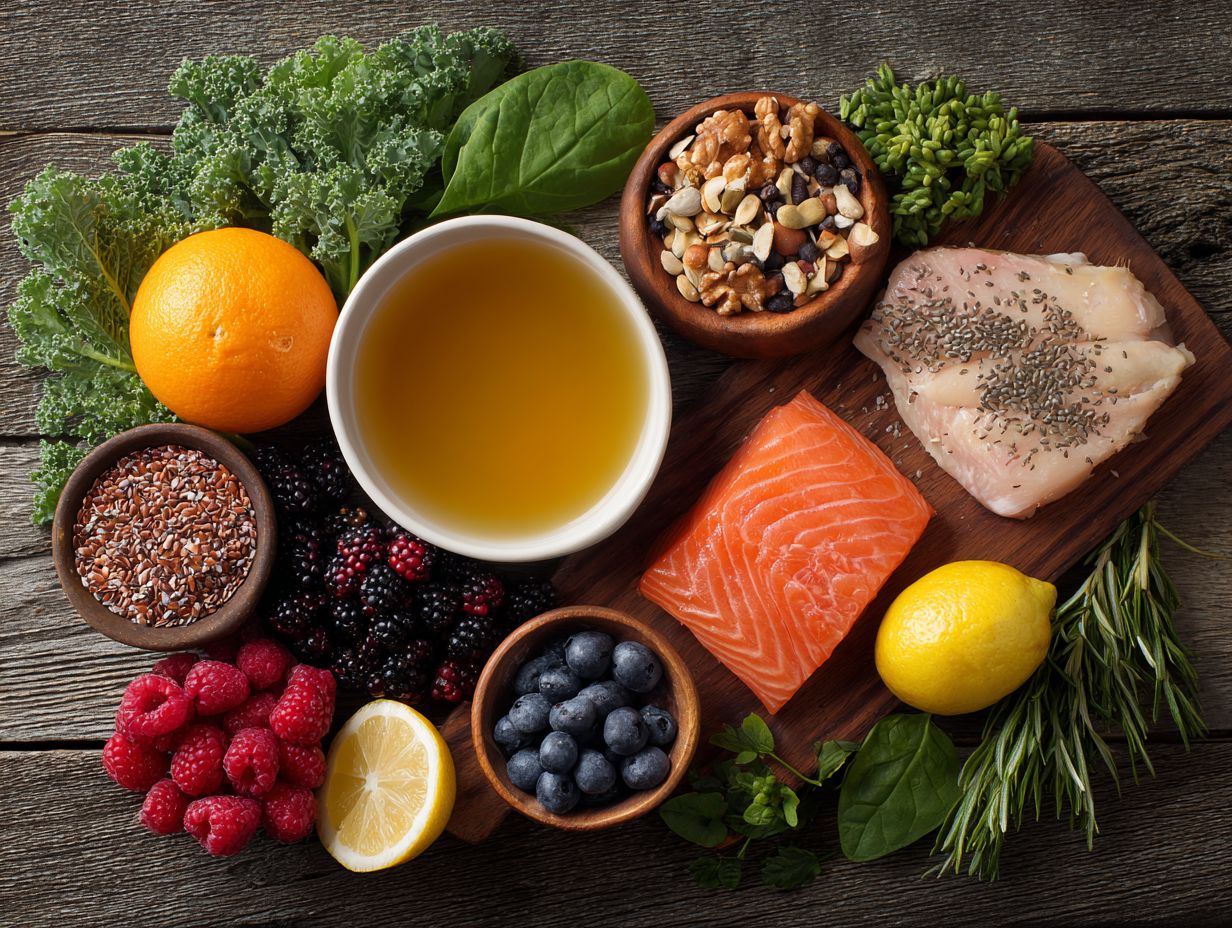
I find that fish and shellfish are outstanding sources of omega-3 fatty acids and collagen, particularly varieties such as salmon and sardines, which are rich in compounds that support collagen integrity.
Incorporating these seafood options into my diet can significantly enhance collagen production. For example, I enjoy grilled salmon with a squeeze of lemon-it’s a simple yet flavorful meal. Alternatively, I often add sardines to salads or pasta dishes for an easy nutrient boost.
I aim for two servings per week and enjoy experimenting with recipes, such as a hearty fish stew or a zesty ceviche.
Not only do these dishes elevate flavor, but they also provide essential nutrients that promote skin elasticity and joint health.
Nuts and Seeds
Nuts and seeds, such as walnuts, chia seeds, and flaxseeds, are rich in essential nutrients like zinc and copper, which play a crucial role in collagen production. I find that incorporating these foods into my diet is both simple and beneficial.
For instance, I like to add walnuts to my morning oatmeal, which not only provides a satisfying crunch but also delivers a significant amount of omega-3 fatty acids.
Chia seeds are another favorite of mine; I often mix them into smoothies or yogurt to boost fiber content and support collagen synthesis. Additionally, I ensure that I use ground flaxseeds for better absorption-they can enhance the nutritional profile of baked goods or be sprinkled over salads for added texture and nutrients.
To further promote skin elasticity and joint health, I also consider using a collagen supplement in conjunction with these foods.
Other Lifestyle Factors
I recognize that while nutrition and dietary choices are essential for collagen production, lifestyle factors such as hydration, which impacts hydration levels, and the use of aesthetic treatments also play a significant role in maintaining collagen health and reducing wrinkles.
Hydration and Its Impact
Staying well-hydrated is crucial for maintaining skin elasticity and promoting collagen production, as dehydration can contribute to premature aging. To ensure optimal hydration and support aging skin, I aim to consume approximately 3 liters of water daily, making adjustments based on my activity level and climate.
I also incorporate water-rich foods into my diet, such as cucumbers, oranges, and spinach, which further enhance my hydration status and provide essential nutrients for skin care. Additionally, I consider incorporating hydration-focused beverages like coconut water or herbal teas to boost my fluid intake and support my overall beauty regimen.
This consistent hydration not only supports collagen synthesis but also contributes to maintaining overall skin health, helping me achieve a youthful glow while reducing the appearance of fine lines and promoting joint health.
Avoiding Collagen-Destroying Foods
I recognize that certain foods can negatively affect collagen levels, particularly excessive sugar, refined carbohydrates, and processed foods that contribute to inflammation and harm joint health. These dietary choices can foster an environment in the body that enhances the breakdown of collagen. For instance, high sugar consumption can lead to glycation, a process that compromises collagen fibers.
Considering this, I prioritize incorporating collagen-boosting foods into my diet, such as leafy greens, citrus fruits, nuts, and poultry.
- Leafy greens offer vital antioxidants,
- the vitamin C found in citrus is essential for collagen synthesis.
- Additionally, I consider adding bone broth, which is rich in collagen and gelatins, as a nutritious base for soups or sauces.
Making these adjustments supports healthier collagen production in a natural way.
Frequently Asked Questions
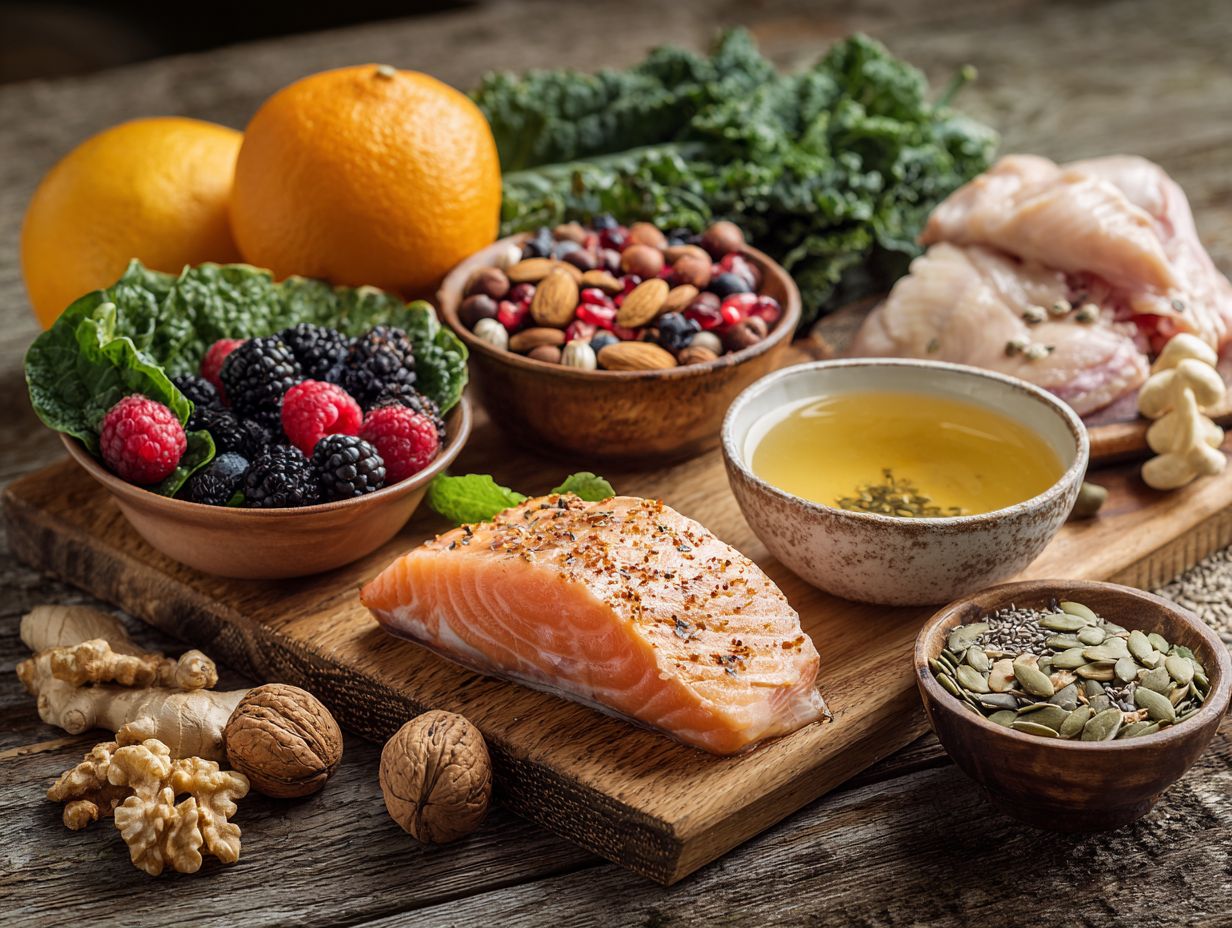
What is collagen and why is it important for our bodies?
Collagen is a protein that makes up the connective tissues in our bodies, such as skin, tendons, muscles, and bones. It is important for maintaining skin elasticity, reducing wrinkles, and promoting overall joint and bone health, making it essential for the human body.
What are some foods that naturally boost collagen production?
Some examples of foods that can naturally boost collagen production include fish, poultry, bone broth, dark leafy greens, citrus fruits, and tomatoes. These foods are rich in nutrients that support collagen production in the body.
Can collagen production be boosted with supplements or creams?
While dietary supplements and creams containing collagen may provide temporary benefits, they do not directly boost the body’s own collagen production. It is important to focus on consuming collagen-boosting foods for long-term results.
Are there any foods that can actually damage collagen production?
Yes, foods high in sugar and refined carbohydrates can damage collagen production. These foods can increase inflammation in the body, leading to a breakdown of collagen and reducing its effectiveness.
How much of these foods should I consume to see a noticeable difference in my skin and joints?
Incorporating a variety of collagen-boosting foods into your diet is key. Aim for at least 2-3 servings per day of fish, poultry, leafy greens, and citrus fruits, and drink bone broth at least a few times a week.
Besides diet, what other lifestyle factors can affect collagen production?
In addition to diet, smoking and excessive sun exposure can also harm collagen production. It is important to limit these behaviors and to protect your skin with sunscreen and protective clothing when spending time in the sun.


